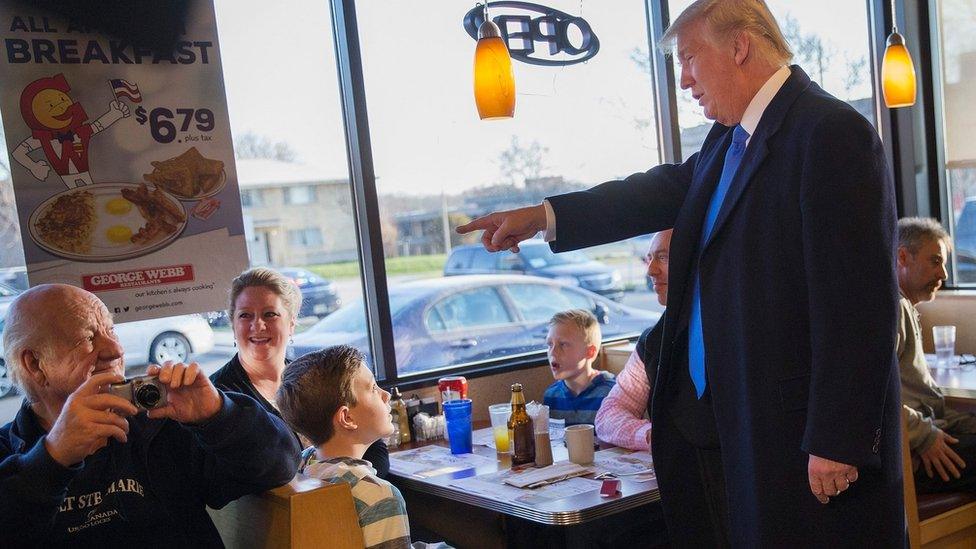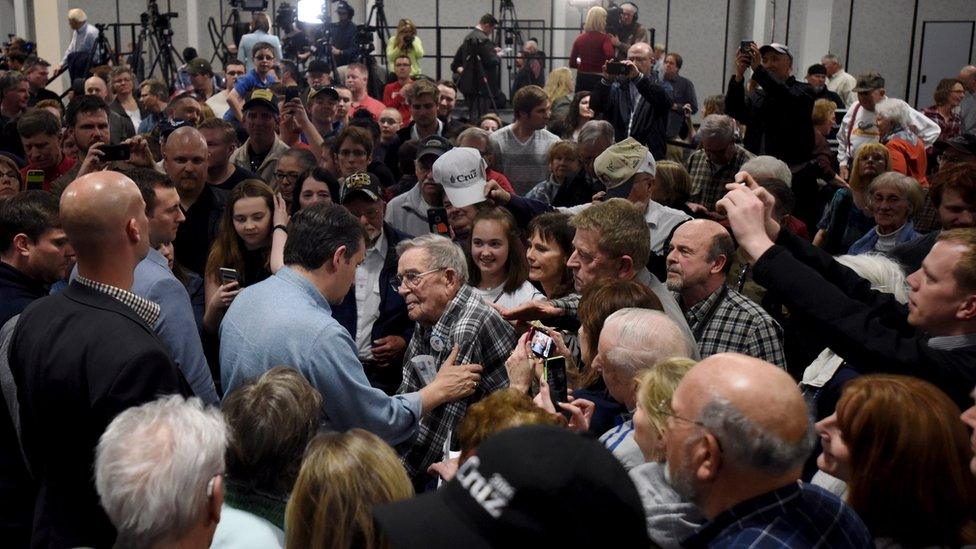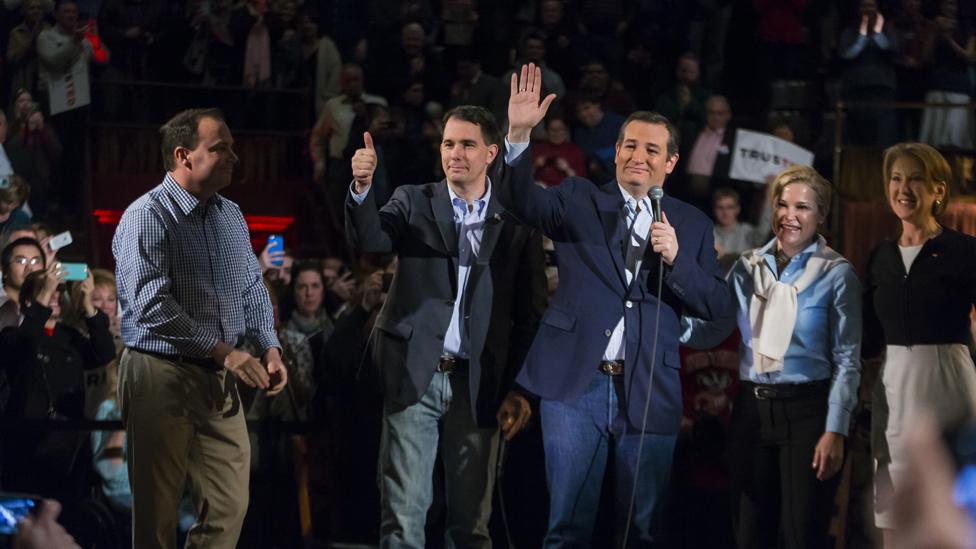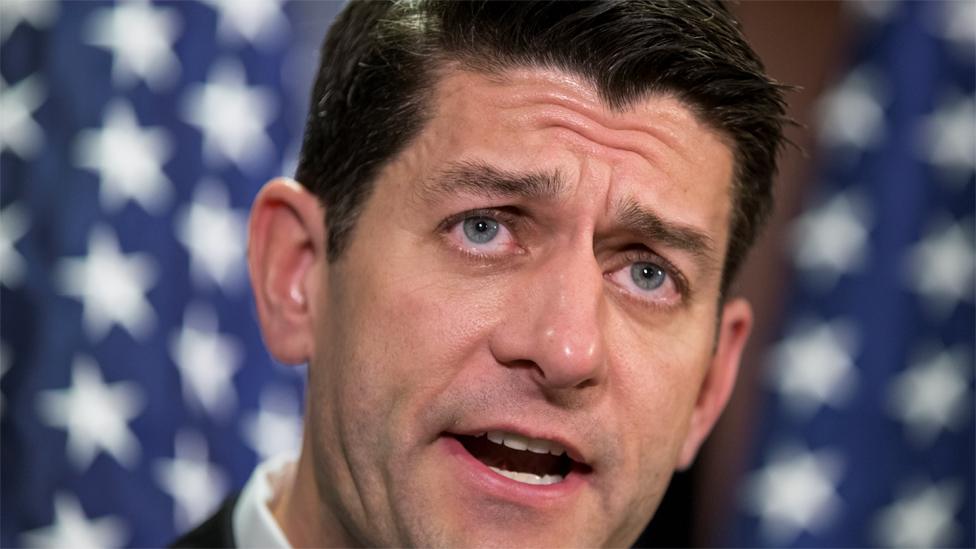US election 2016: Is it all going wrong for Trump in Wisconsin?
- Published

If Donald Trump isn't the 2016 Republican presidential nominee - if sometime between now and the end of the party convention in late July the prize slips from his grasp - Wisconsin could be where it all started to go awry.
At this point it's conventional wisdom that Mr Trump has had a terrible week on the campaign trail.
His top aide was indicted for accosting a reporter. He stumbled when trying to answer questions about abortion, angering both the left and the right. Wisconsin's popular Republican Governor Scott Walker endorsed his opponent, Ted Cruz. And Mr Trump saw his lead in this pivotal mid-western state evaporate.
By Sunday evening, at a rally in a half-full downtown Milwaukee theatre, the front-runner was showing signs of frustration.
He mocked his opponents in the #neverTrump movement, which has vowed to fight the New Yorker to the July Republican convention and beyond.
"If they would have worked so hard, so diligently against President Barack Hussein Obama," he said, "they would have beaten him. They would have had great budgets. They would have had everything they wanted."
Mr Trump enters the Wisconsin primary on Tuesday with a commanding lead over Mr Cruz in the race for 1,237 delegates necessary to secure the Republican nomination, but his path to reach that number is narrow.
If he is soundly defeated in Wisconsin, as polls now indicate is possible, the margin of error in future contests - such as New York, Pennsylvania and California - drops to near zero.

And Wisconsin is proving to be a very difficult nut for Mr Trump to crack. In addition to opposition from Mr Walker, the New Yorker has faced oblique criticism from Paul Ryan, the home-state hero who serves as speaker of the US House of Representatives.
He's also been resoundingly denounced by the most prominent conservative talk-radio commentators in the state.
"I think the deepest concern that talk radio people have about Trump is not so much that he's rude and will say politically incorrect things, but that they don't buy that he's a bona fide conservative," says University of Wisconsin public affairs professor Donald Moynihan.
Five things to know about Ted Cruz
Full election coverage from the BBC
In other states Mr Trump has been able to capitalise on the frustration many rank-and-file Republicans have with their party's leadership, but there are few signs of such a schism in Wisconsin - in part because of the pitched battles conservatives, led by Mr Walker, have fought with liberals in the state, both in the legislature and at the ballot box.
If Trump is routed in Wisconsin, says Scot Ross, executive director of liberal watchdog group One Wisconsin Now, "they're going to say it's because his support has eroded - but it's really because the structure of the state of Wisconsin is tailor made for this to happen to him".
He said that the Wisconsin-based non-profit powerhouse the Bradley Foundation, external, which has spent hundreds of millions advancing conservative priorities across the US, likely views Mr Trump as a threat. The group, led by Michael Grebe, heavily supported the rise of three influential Wisconsin Republicans - Mr Walker, Mr Ryan and Republican Party head Reince Priebus - and is now quietly organising the Trump resistance in the state.

The Republican establishment is mainly backing Ted Cruz against Donald Trump
"This is a total party conspiracy against Donald Trump here that is being fully realised, whether people want to admit it or not."
Meanwhile Mr Cruz is surging in Wisconsin - and increasingly aiming to be the man the Republican Party relies on to take down Mr Trump.
Before a town hall forum in Madison, Wisconsin, on Sunday morning, the Texas senator - who previously had been reviled by Washington insiders as an uncooperative ideologue and political showboat - was boasting about his ability to rally the party behind his banner.
"Across the country 65 to 70% of Republicans recognise that Donald Trump is not the best candidate to go head-to-head with Hillary Clinton," he said. "What we are seeing in Wisconsin is the unity of the Republican Party manifested."
He noted that five former Republican presidential candidates - Rick Perry, Lindsey Graham, Jeb Bush, Carly Fiorina, and Mr Walker - had endorsed him. "You've got the full ideological spectrum of the Republican Party," he said.
Even if Mr Cruz drastically outperforms expectations in Wisconsin and in the states to come, however, his path to the nomination relies on an open convention where formerly committed delegates are free to support whomever they choose after the first rounds of balloting end in a deadlock. He made his pitch for their support in Wisconsin, as well.
Using Hungry Hippos to explain a contested convention
"If we get to a contested convention, I believe we will be in a very, very strong position to earn a majority from the delegates who were elected by the people," he said.
He also pushed back against recent calls to change the party rules to allow an open Republican convention to pick a nominee who did not compete in the primaries - such as Wisconsin's Mr Ryan.
"The nice thing is, Washington doesn't control what happens," he said. "The delegates control what happens, and the delegates are elected by the people."
Preventing a so-called "white knight" from taking the nomination is one area where the campaigns of both Mr Cruz and Mr Trump are in agreement.

Paul Ryan has said he has no interest in being a part of a convention fight
But Mr Trump, at least on Sunday night, still appeared to have difficulty wrapping his head around the pitched backroom convention battle that may be looming if things don't go his way in Wisconsin - and neither did his supporters.
"If Donald Trump gets the most votes but doesn't win, I think the country would feel cheated," Joe, a Trump fan who works in a Milwaukee water-processing factory, said. "The people are speaking. It not only cheats us, it shows there's a system not listening to the people."
During his speech Mr Trump groused about states like Louisiana, where Mr Cruz's campaign has secured more delegates despite having fewer votes than Mr Trump on the 1 March primary - a pattern that could repeat itself elsewhere and set the stage for convention-floor strife.
"I don't care about rules folks," Mr Trump said. "I go out. I campaign. We win. I get the delegates."
The challenge for Donald Trump is it may not work out that way. And Ted Cruz knows it.